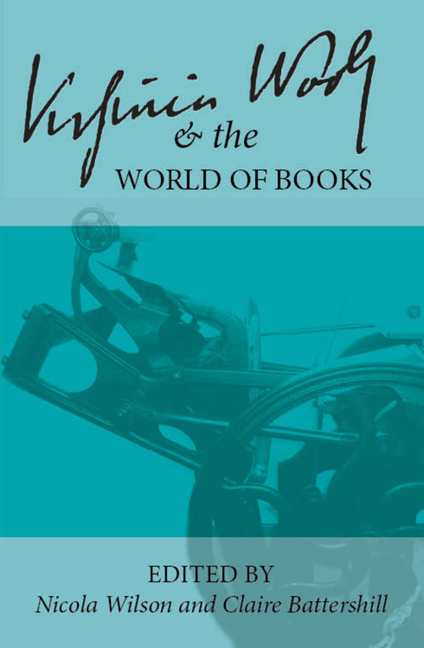 Virginia Woolf and the World of Books
Virginia Woolf and the World of Books Book contents
- Frontmatter
- Contents
- Introduction
- List of Abbreviations
- Keynote
- In the Archives
- Craftsmanship
- The Hogarth Press
- Hours in A Library
- Hours in a Library: Virginia Woolf and Leslie Stephen
- Two Libraries: Reading A Room of One's Own and Margaret Oliphant's “The Library Window”
- Bibliographers, Booksellers, and Collectors of the Hogarth Press
- The Art of the Book
- The Art of the Narrative
- Making New Books: Creative Approaches
- The Book in the World: Woolf's Global Reception
- Editing and Teaching Woolf
- Intertextuality
- Lives in Writing
- Notes on Contributors
Bibliographers, Booksellers, and Collectors of the Hogarth Press
from Hours in A Library
- Frontmatter
- Contents
- Introduction
- List of Abbreviations
- Keynote
- In the Archives
- Craftsmanship
- The Hogarth Press
- Hours in A Library
- Hours in a Library: Virginia Woolf and Leslie Stephen
- Two Libraries: Reading A Room of One's Own and Margaret Oliphant's “The Library Window”
- Bibliographers, Booksellers, and Collectors of the Hogarth Press
- The Art of the Book
- The Art of the Narrative
- Making New Books: Creative Approaches
- The Book in the World: Woolf's Global Reception
- Editing and Teaching Woolf
- Intertextuality
- Lives in Writing
- Notes on Contributors
Summary
Collecting objects of any sort is generative. In the case of finite and elusive fine press treasures, it is also not for the weak of spirit nor of pocket book. While it is possible to be a modest Hogarth Press collector, your expectations and focus will, by necessity, place you in a different category to those who have more funds and opportunities. You suspect you may never have, nor will ever see, outside of a museum or library special collection, the truly great items—and you would be correct. Many of the greats are already in the possession of a serious collector or part of a university collection; both are unwilling or unable to clear shelf space to allow the next generation of collectors to place them on theirs. I have been an antiquarian and rare bookseller for over a decade. In this relatively short time I have handled remarkable Hogarth Press books, objects and Bloomsbury-related materials and can say with confidence that although the rarest of treasures may no longer be available to current collectors there are numerous items still available in the marketplace. Collecting requires patience and diligence, and an education in your interest area.
When I say the greats of the Hogarth Press in terms of collecting, we think immediately of the rare, limited edition books hand-printed by the Woolfs. The first effort to roll off the press in July 1917 was Two Stories by Virginia and L. S. Woolf, the individual copies covered in various wrappers as the paper was bought from a local stationers as needed. Later the Woolfs would utilize handmade papers from Roger Fry's Omega Workshop. They were committed to ideas turned into objects, objects crafted by the human hand to do justice to the ideas enclosed within their fragile paper wrappers. The Woolfs were to go on to print and publish a total of thirty-four publications in this manner, the final title being Dorothy Wellesley's 1932 Jupiter and the Nun, before turning the printing entirely over to others while remaining the Hogarth Press publishers. Beginning in 1919 with John Middleton Murry's The Critic in Judgment (printed by the Prompt Press, but bound by the Woolfs), by the close of 1946 the Press had engaged thirty-four outside printers (Woolmer 225).
- Type
- Chapter
- Information
- Virginia Woolf and the World of BooksSelected Papers from the Twenty-seventh Annual International Conference on Virginia Woolf, pp. 115 - 120Publisher: Liverpool University PressPrint publication year: 2018


